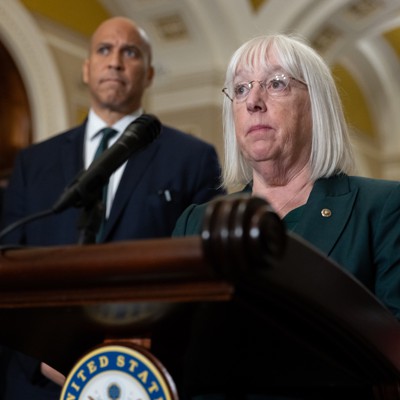Shutdown layoffs would boost energy costs, increase overdoses and slash oversight, Democrats say

The Trump administration’s proposed layoffs would have wide-ranging impacts felt by Americans across the country, congressional Democrats said this week, with consequences ranging from higher energy bills to compromised preparation for the next pandemic.
In a series of letters to administration officials, the Democrats, led by Sen. Patty Murray, D-Wash., the party’s top appropriator in the Senate, demanded the agencies abandon their layoff plans and provide more details on how they were conceived. Implementation of the reductions in force are currently paused due to a court order.
The administration laid off around 4,000 people on Oct. 10 across seven agencies. The cuts followed through on a threat from President Trump and Office of Management and Budget Director Russ Vought to inflict pain on the federal workforce as a consequence of the government shutdown.
At the Health and Human Services Department, the lawmakers said, the haphazard nature of the RIFs led to the Centers for Disease Control and Prevention to reverse more than half of the original 1,300 notices it originally sent. CDC still followed through on seeking to cut data scientists, health statisticians, chronic disease experts and communicators who relay critical health information to the public, the senators said.
HHS’ Substance Abuse and Mental Health Services Administration, the 30 Democratic senators said, now has less than half of the staff it employed when Trump took office. The latest cuts would undermine youth mental health outreach and recent progress in reducing overdose deaths, they said.
“These RIFs are the latest example of an administration that continues to attack public health programs in an effort to silence career scientists, which will put American lives at risk,” the senators said.
They added the Health Resources and Services Administration has cut staff in offices that support grants for treating and detecting depression in women and screening for domestic violence, provide emergency medical services for children and train nurses. Cuts to the Office of the Assistant Secretary for Health would damage family planning programs while reductions in the Administration for Strategic Preparedness and Response would diminish capacity for disaster and emergency response efforts.
“The reckless and harmful actions the department and this administration have taken over the last several months undermines the critical role HHS plays in ensuring the health and well-being of all Americans,” the senators said.
Spokespeople for HHS noted the impacts of the shutdown—which they blamed on Democrats—on the department, including critical staff working without pay, Head Start providers losing federal funding, some rural hospitals facing suspensions of certain payments and interference with CDC data collection.
“All HHS employees receiving reduction-in-force notices were designated non-essential by their respective divisions,” said Andrew Nixon, one of the spokespeople. “HHS continues to close wasteful and duplicative entities, including those that are at odds with the Trump administration’s Make America Healthy Again agenda.”
The Democratic lawmakers said across the agencies issuing layoffs, the Trump administration was seeking to implement his budget requests without congressional approval. They said the agencies may not be able to carry out their statutory responsibilities, including to meet deadlines to dole out funding. The agencies were also vulnerable to more fraud and abuse without a sufficient workforce for oversight, they said.
At the Energy Department, for example, Murray and Rep. Marcy Kaptur, D-Ohio, said staff in place to monitor for errors, including for billions of dollars allocated in implementation of the 2021 Infrastructure Investment and Jobs Act, were being cut.
“With fewer career oversight and program management staff, the department risks weaker grant monitoring, delayed audits, reduced ability to detect misconduct, and diminished follow-through on corrective actions,” they said.
Cuts in the Office of State and Community Energy Programs, Murray and Kaptur said, jeopardizes the $360 million Congress authorizes annually for the Weatherization Assistance Program that supports energy efficiency upgrades. Staff reductions in the Office of Energy Efficiency and Renewable Energy would slash research that could lower energy costs and boost the domestic supply chain for energy, they said.
Energy’s RIFs did not include a set implementation date, which the lawmakers said created added confusion.
An Energy spokesperson said the offices targeted for cuts were in large part responsible for Biden administration policy that Trump is seeking to unwind.
“They oversaw billions of dollars in wasteful spending and massive regulatory overreach, resulting in more expensive and less reliable energy,” the spokesperson said. “These offices are being realigned to reflect the Trump administration’s commitment to advancing affordable, reliable, and secure energy for the American people and a more responsible stewardship of taxpayer dollars.”
The Education Department made significant cuts to the Office of Special Education Programs, which a group of 30 Democratic senators said will make it significantly harder to administer $15 billion that supports 15 million students with special needs. Reductions in the Office of Elementary and Secondary Education, they said, would harm the department’s capacity to ensure schools are compliant with federal law, that states are held accountable for their educational programs and to provide educational services to homeless children.
They added that additional cuts would decimate the Rehabilitation Services Administration, which provides training for people with disabilities, and a variety of higher education programs.
The department earlier this year laid off one-third of its staff and has cut half of its employees overall. The layoffs at HHS followed 10,000 RIFs earlier this year and more than 20,000 total reductions.
“Continuing to fire employees working on bipartisan programs that provide students with additional educational resources or confer educational rights on children does not serve these students better or make the government more efficient,” the lawmakers said. “Instead, it will mean students with disabilities cannot access services they are guaranteed, other students will not be able to have their rights enforced, schools may not be held accountable for the academic achievement of their students, taxpayer dollars will be used less effectively, and more waste, fraud and abuse will occur.”




